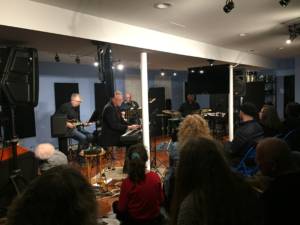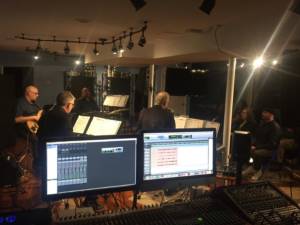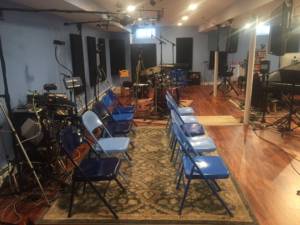JAZZ WORKSHOP FAQS

Jazz Workshop in Bucks County
Q: How long are the Jazz Workshops?
A: Workshops will meet for 10 consecutive weeks, lasting for two hours at each session. Some weekday evenings are available as are some weekend time-slots.
Q: What days will the Jazz Workshops meet?
A: Workshops will be offered based upon availability of all involved. Every effort will be made to accommodate various schedules; however, once you are enrolled then your workshop will meet for 10 consecutive weeks at the same time.
Q: What can I expect to learn?
What are the goals of the workshop?
A: We will start to learn the jazz language and apply it in our own ways. We will do this by working on assigned tunes, and dissecting the specifics of this music. Workshops will concentrate on learning how to listen, interact, and engage in a musical dialog playing jazz standards within a group setting.
Q: Do I need to be at each and every session? What if I have a conflict on a certain week?
A: Everyone will be expected to attend each session. This will be the only way that the workshops can be most effective. Once a workshop has a minimum number enrolled (drums, bass, piano and/or guitar, and a horn or vocalist, e.g.), then everyone is on board for that day and time-slot. Your fellow musicians will be counting on you, and your commitment is crucial to making this successful for all involved.
Q: Is there an audition?
A: Informal “auditions” will be scheduled with the goal of placing you with others of similar ability. After filling out the Jazz Workshop Sign-Up Form, let’s talk on the phone, and we’ll schedule a time to for you to come and hang out at my studio at your convenience (no charge), and we’ll play a bit. This will help me tremendously when placing you in a workshop.
Q: How do you determine into which Workshop I get placed?

Play jazz in a group setting
A: All musicians will be grouped, in part, based on their answers on the Jazz Workshop Sign-Up Form. Please be as accurate and as honest as possible. The informal auditions are also very helpful.
Q: Will there be any options to change to a different workshop?
A: No. However, please talk to me privately if you have questions or concerns at any time during our 10-weeks together.
Q: What do I need to bring?
What is expected of me?
A: You will need your enthusiasm and dedication to learning. This includes listening to this music on your own, and coming prepared. Make sure that you have worked on all assigned tunes — tunes are to be learned outside of the workshop sessions. Bring pencils, a blank manuscript book, and a Real Book. There will be pdfs available for anyone.
Contact me during the week if you ever have any questions or concerns.
Drummers — Bring sticks, brushes and mallets. You could also bring your favorite cymbals and/or snare drum. There is a Yamaha Live Oak Custom drum set tuned nicely, and well-maintained.
Bassists —Bring your bass and a tuner. There is a Hartke Kickback bass amp.
Guitarists — Bring your guitar and a tuner. There are two different Fender solid-state amps.
Pianists — We have a 1908 Knabe grand piano here. In addition, there is a 88 key Yamaha P-115 digital piano with weighted keys.
Horn Players — Bring your horn and, if possible, a Real Book in your key. There will be pdfs available for anyone.
Vocalists — Bring lead sheets of your favorite jazz standards in your key whenever possible. This is something that this workshop can help you develop if you need help with this.
Q: What kind of training/qualifications do you have?
A: I have been playing drums for over forty-five years, and have close to that many years of professional experience performing. At the Berklee College of Music, I studied with Skip Hadden and Joe Hunt. I also studied with Alan Dawson while in Boston. Buster Bailey was a mentor of mine when I lived in New York City, as was Kenwood Dennard. I am a member of the Vic Firth Private Drum Teacher Program; Hudson Music Teacher Integration Program; the Percussive Arts Society; and the Professional Drum Teachers Guild.
In NYC, I worked with such artists and ensembles as Ralph Towner, Bo Diddley, The Drifters, The Ink Spots, The Marvelettes, The Coasters, The Crystals, Candido Camero, Gary U.S. Bonds, and The Big Apple Circus. In addition to teaching privately, from 1991 to 2000 I was a percussion instructor at The Juilliard School with the Music Advancement Program, a program dedicated to bringing music to inner-city children. In 2006, I moved back to my native Denver, Colorado, where I played with Richie Cole, Nelson Rangell, and other jazz and blues artists. I also played for the 2012 production of Irving Berlin’s White Christmas at the Denver Center for the Performing Arts. My wife and I relocated to Yardley in October 2016.
Q: Where are you located?

Jazz Performance Seating Area
A: Gregory Tech Drum Center is in Yardley, PA, conveniently located near Rt 295 and Rt 1 — close to Washington Crossing, Newtown, Richboro, New Hope, Princeton, NJ and Hamilton, NJ — easily accessible to the greater Philadelphia area.
Q: How do I get started?
A: Fill out the Jazz Workshop Sign-Up Form.
Q: What is the cost of the Jazz Workshop?
A: The 10-week workshop costs $250.00 per person. Pay For Jazz Workshop.
Q: What forms of payment do you accept?
A: Gregory Tech Drum Center accepts major Credit Cards, Venmo, Zelle, Personal Checks, Google Pay, PayPal, or Cash.
Q: What is your cancellation policy?
A: There will be no cancellations or refunds for the Jazz Workshop. Exceptions will be made for inclement weather. Please keep in mind that your fellow musicians are counting on you.
PLEASE NOTE: No weapons of any kind are allowed on the premises of Gregory Tech Drum Center
